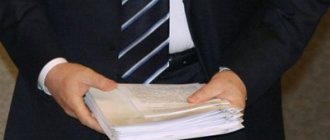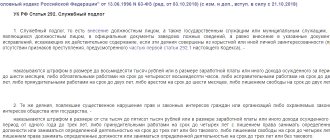In Art. 292 of the Criminal Code of the Russian Federation defines the concept of official forgery, and lists possible options for sanctions for committing such a crime.
Forgery is defined as the provision of knowingly false information or the deliberate introduction of changes to official documents that distort the essence and meaning. It doesn’t matter what type of document it is: forgery can be carried out on paper or electronic media.
Often when using the term official forgery, people put into it a meaning that is somewhat different from the true understanding. What is the essence of this action, how forgery is determined, the possibility and purpose of the commission, and what punishment the crime may entail, we will consider in this article.
Motives
The motive may be obtaining material benefits or any privileges, patronage, future loyalty from management, or inflating results for the sake of prestige.
The interest of the person committing the forgery may be personal in nature, or the subject may be seeking benefits for others.
When a fact of forgery is detected, the desired results are not taken into account, just as the actual non-use of the results of falsification is not taken into account. The forgery is considered committed at the moment the amendments are completed.
Forgery and falsification: the difference
A crime qualified under Art. 292 of the Criminal Code, has a composition similar to some other criminal offenses. First of all, official forgery should be separated from falsification of evidence. In both cases, at first glance, changes are being made to the documents. However, with falsification, it is precisely a deliberate distortion that is observed, and not a fake. In other words, the content of the document changes in the manner in which the forger requires it. In addition, in the future the item must be used as evidence (Article 303 of the Criminal Code of the Russian Federation).
Object and subject
When understanding the situation, you should separate the concepts of “object” and “subject”.
The object of the crime is state interests, in terms of the performance by government agencies of their functions, and the subject is official acts and resolutions regulating or confirming the results of this activity. The commission of a crime that interferes with the normal functioning of any state or municipal institution is the objective side of the crime.
In this case, not every document can be the subject. The storage medium must meet specific requirements. We are not talking about the material of the carrier, but about its quality side.
The subject matter is considered official acts: legally significant federal or territorial official decrees or documents related to them. Which can be either outgoing or incoming, provided that they have undergone official registration.
Material on the topic: Forgery of documents, Article 327 of the Criminal Code of the Russian Federation: punishment for the offense
The following requirements apply to documents offered as a subject:
- The act must certify the specific results of events of legal or economic significance. Moreover, it can be of a permissive or prohibitive nature.
- A mandatory feature is the presence of details: date of preparation, stamp of the authority or organization, incoming or outgoing registration number, signature indicating the position, surname and initials of the person who compiled the document, seal.
Historical reference
Any crime and the norm that implies responsibility for it have their own history of formation. The fight against such an act as forgery began long before the emergence of many modern states.
In Roman law, this concept was interpreted very broadly. Forgery, in particular, included forgery of wills, measures, coins, scales, seals, bribery of judges, and perjury. It was a collective concept and, from a legal point of view, not suitable for anything, covering all possible cases concerning the concealment of the truth.
English criminal law defined forgery in the 1981 Act as “the creation of a false means for the purpose of inducing someone to mistake it for the original and thereby cause harm to himself or a third person.
In domestic law, the concept appeared during the creation of “Russian Truth” and went through various metamorphoses. The content of the currently relevant criminal law norm on forgery (Article 292 of the Criminal Code) is closest to the formulation of the Soviet era. Then this act was defined as forging genuine documents or drawing up false ones. At the same time, forgery was divided into official and simple, that is, committed by a private person.
Objective side
There are two options to commit forgery:
- drawing up documents, regardless of their form, with deliberately distorted facts;
- make corrections to the informative part by adjusting or distorting the content of the text.
Methods of committing forgery are usually divided into intellectual and material. In the first case, we mean the production of a new document on company letterhead containing false information. In the second method of execution, changes are made to an already existing official document.
Comments to Art. 292 CC
As mentioned above, the subject of forgery is official documents. The comments on this matter include the following information.
An official document is a written act executed on electronic or paper media and emanating from one or another level of the state apparatus. It must certify specific events and facts that entail certain legal consequences for the persons using it. An official document must contain the necessary details: stamp, seal, date, number, official signature. These include, for example: civil registry office registration books, work book, identity card, etc.
When speaking about the selfish intent of a criminal, the legislator means the person’s desire to extract some kind of benefit for himself (illegal). It can be either material, expressed in the acquisition of the right to property, or intangible – the acquisition of the right to dispose of any objects of intellectual property.
The legislator’s formulation “other personal interest” is interpreted quite broadly: excessive vanity, protectionism, careerism, concealment of negative results of one’s work activity, etc.
Establishment of fact
It is not always possible to establish the fact of forgery when an official document is discovered.
When determining the source of receipt of a document, it is important to determine the person who compiled it and determine whether the subject had the authority to draw up and sign the act. If these actions are not part of his official duties, then it will not be possible to qualify the act as forgery. In such a situation, or when falsifying an unofficial document, the actions of the subject fall under Article 327 of the Criminal Code of the Russian Federation. It is quite possible that both articles will compete.
To establish the elements of a crime, it is not necessary to establish the consequences of using an illegitimate document. The act is recognized as committed upon completion of the act of making false changes or deliberately drawing up an incorrect document.
The subsequent fate of the document, its use in any authorities or for any purposes is not commented on by Article 292. But the size of the consequences and their effect (it may turn out to be positive) are taken into account when determining the severity of the punishment.
Material on the topic Comments on Article 306 of the Criminal Code of the Russian Federation for knowingly false denunciation
Most often, official forgery is carried out to achieve some goal, to commit or conceal an action that has already been committed, usually illegal. In such a situation, the subject will be held liable for both crimes simultaneously. Or for forgery and preparation for another illegal act, if the commission was prevented.
Part 1, Article 292 of the Criminal Code of the Russian Federation – commentary
The elements of any crime are an object, a subject, an objective and a subjective side; the absence of these components in an act entails leaving the person who committed the crime without punishment. The subjective side of official forgery is two specific actions that can be committed both together and separately:
- preparation of deliberately false official documents;
- making changes to these documents that distort the general meaning of the paper.
In this case, official documents mean regulations, diplomas and certificates, temporary disability certificates, work books, service certificates and more. In this case, the subject of a crime can be not only documents that already exist, where new information can be entered or corrections can be made, but also newly created documents that have legal consequences and certify a legal fact.
Important! It is worth noting that official forgery occurs not only in papers emanating from a specific body - an official, but also in other papers that come for its consideration, for example, in audit reports.
The end of the crime is the moment of committing illegal actions with documents, that is, for the legislator, its further fate does not matter - whether the document will be used after amendments are made to it or not. Official forgery is always committed only with direct intent; in the absence of such, this act can be qualified as negligence, since the citizen unintentionally showed negligence when correcting a document. Only officials and state/municipal employees are held criminally liable for forgery; employees of organizations and citizens are not liable for this offense.
Possible consequences
The article defines a fairly wide variability of punishment. Depending on the consequences of using a falsified document, the judge may pronounce a sentence and impose a punishment in the form of:
- a fine in the amount of 100 to 200 minimum wages or in an amount equal to the subject’s salary for 1 or 2 months;
- undergoing compulsory work for a period of up to 240 hours;
- correctional labor for a period of 12 to 24 months;
- imprisonment for up to 2 years.
Depending on the severity of the consequences of forgery, the statute of limitations for this crime expires after a maximum of 6 years. Fraud is rarely an independent crime.
Official forgery is unique in terms of the subject committing criminal acts. They can be an employee of a government agency at any level. On the part of the subject, the presence of direct intent is always visible, namely, the knowledge of the subject’s actions. Personal direct interest (financial or moral) is a mandatory sign of the subjective part of the forgery.
Legislative framework: types of liability
The legislation defines official forgery as the conscious, purposeful entry into documents of data that significantly distorts their content or is deliberately false. It is assumed that the attacker is fully aware of the consequences of his actions and reports that this information is false. Thus, official forgery is the distortion of the contents of documents for personal, selfish interests.
Official forgery is a criminal offense that is punishable by the following penalties:
- Fine up to 800 thousand rubles. or in the amount of the entire salary for six months.
- Or compulsory work up to 480 hours.
- Or correctional labor for up to 24 months.
- Or forced labor for up to 24 months.
- Or arrest for up to 6 months.
- Or imprisonment for up to 24 months.
Penalties are increased if it is proven that a significant violation of the rights of citizens, companies, authorities, society and the state as a whole has occurred:
- Fine up to 500 thousand rubles. or in the amount of the entire salary for 36 months.
- Or forced labor for up to 48 months. with deprivation of the right to work in certain positions for up to 36 months. (or without deprivation).
- Or imprisonment for up to 48 months. also with deprivation of the right to work for 36 months. or without it.
A separate article includes a similar act, as a result of which a foreign resident illegally acquired Russian citizenship. In this case, the following liability measures are provided:
- Fine up to 300 thousand rubles. or in the amount of the entire salary received within six months.
- Or correctional labor for up to 24 months.
- Or deprivation of the right to work in certain positions for up to 36 months.
- Or compulsory work up to 480 hours.
- Or forced labor for up to 5 years.
- Or imprisonment also up to 5 years.
Nuances
So, intent or motive is an integral sign of forgery. There will be no corpus delicti if intent is not proven.
The fact of a criminal act is considered committed at the moment the distorting amendments are completed or the writing of a false official document is completed, it does not matter whether the amendments were subsequently canceled or the documentation was confiscated. When considering this circumstance, it is necessary to take into account that the entry into the official register of invalid data, which is the basis for registration of citizenship, is an action falling within the area regulated by Art. 292.1 in part 1 of the Criminal Code of the Russian Federation.
In fact, these are two criminal acts: official forgery, which became the basis for the illegal issuance of a passport of a citizen of the Russian Federation. Official forgery does not require classification as a separate crime if it is a constructive component of another act.
Material on the topic House arrest: what is it and what restrictions exist
As a separate comment, it should be noted that the qualification of forgery provides for cases where the legitimate interests of citizens or guaranteed rights are significantly infringed. In fact, part 2 of article 292 is a legal norm in relation to part 1 of article 285, which determines the fact of abuse of official powers.
What else you need to know about official forgery
According to the method of committing the crime, official forgery can be:
- intellectual – production of a document on official letterhead, but its content is incorrect;
- material – transformation of the content or type of paper.
Often, forgery is used to conceal another crime. For example, in order to hide embezzlement, in this case, criminal actions will be qualified under Part 2 of Art. 292 and Art. 160 of the Criminal Code of the Russian Federation. If an official commits forgery of documents for the purpose of further appropriation of property, then, in addition to criminal liability for forgery, the person will be liable for theft. However, official forgery can also be qualified as an extreme necessity if the official committed illegal actions in order to avoid further harmful consequences that would be more dangerous than the harm actually caused and if it was impossible to do otherwise. Criminal legislation allows the concept of “official” in relation to this crime to be interpreted more broadly in terms of the powers delegated to him. So, if a citizen draws up an official document, he must have the corresponding job responsibilities, which are assigned to the official in the manner prescribed by law - in the employment contract, job description, etc. If there is no official confirmation of responsibilities, but the official issued a document with knowingly false information in it, since this area of activity is under his responsibility, this document will be declared invalid.
Important! The motive for official forgery is not always selfish intentions. Thus, an official may enter deliberately false information into documents in order to embellish the state of affairs or hide his incompetence.
It is worth noting that according to static data, a steady increase in crimes under Article 292 of the Criminal Code of the Russian Federation is visible. Moreover, new forms of forgery are increasingly emerging, for example, in the field of IT technologies (electronic documents).
Examples of judicial practice
Judicial practice shows that the statistical number of crimes of this type has not changed in recent years and fluctuates at no more than 5 thousand per year.
Cases of independent detection of official forgery are quite rare, but quite often forgery is considered in the totality of acts. Studying data from judicial practice, it can be established that these acts are often committed by healthcare workers to conceal medical errors or negligence.
The leaders among them are late entries into medical records of indications for the provision of necessary assistance. Unfortunately, a typical situation is when, through the fault of a medical worker, due to failure to carry out the necessary procedures, the patient dies.
Later, the doctor, in order to avoid liability, makes notes on the supposed assistance provided in the patient’s chart. If this fact can be established, then the employee is charged with liability in a set of sanctions.
When carrying out investigative measures, any possibility of error in the process of classifying crimes should be excluded. In judicial practice, there was a case when a local government employee was accused of receiving illegal profit from providing an official certificate with distorted information.
During the investigation, it was established that the subject was not the initiator of the action, but only performed the functions of a clerk in accordance with the written instructions of his direct supervisor. The list of the specialist’s job responsibilities included several dozen references to his exercise of control in various areas; in fact, the subject may not have performed the listed actions.
In this case, the employee’s actions were reclassified and fell under Art. 292. This example clearly shows that the law has a preventive function. The effect of Article 292 is largely aimed at combating corruption among employees.
Watch the conversation in the traffic police about forgery in the following video:
Subject and subjective side
The subject of official forgery is defined as special. He is a person in the public service, either an official or an employee of local government.
The law characterizes the subjective side of forgery as guilt in the form of direct intent. The criminal is aware of the illegal nature of his actions and wants to commit them. It is important to remember that the mental attitude of the perpetrator towards forgery must always be associated with selfish intent and other personal interest.
Recommended publications on logos-pravo.ru
Buying a home where children live has become dangerous! (The Constitutional Court of the Russian Federation recognized paragraph 4 of Article 292 of the Civil Code of the Russian Federation in the part that determines the procedure for the alienation of residential premises in which minor family members of the owner of this residential premises live, if this affects their rights or legally protected interests that do not comply with the Constitution of the Russian Federation). See in more detail Resolution of the Constitutional Court of the Russian Federation of June 8, 2010 N 13-P in the case of verifying the constitutionality of paragraph 4 of Article 292 of the Civil Code of the Russian Federation in connection with the complaint of citizen V.V. Chadayeva
Rights to residential premises of a family member of the previous owner
Buying a home. Beware - family member of the previous owner
Eviction of a child as a former family member
Is it possible to evict a family member from an apartment who refused to participate in its privatization? (what are the consequences for the person who agreed to privatization if he does not participate in privatization? Can he then be evicted as a former member of the owner’s family, or upon transfer of ownership? What is the judicial practice?)










